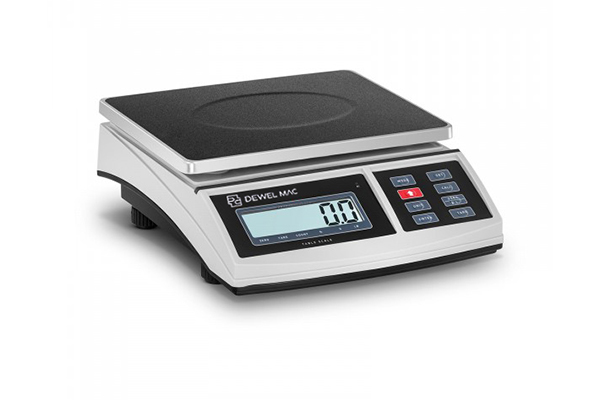What Bench Scales Are Designed to Do
Core Functions in Industrial Weighing
Bench weighing scales serve several essential roles in the food industry. They help operators achieve precise measurements for recipes and portion control. These scales also support safety regulations by tracking ingredients before use.
| Core Function | Description |
|---|---|
| Precise Measurements | Ensures accuracy in food recipes and portions for chefs and operators. |
| Safety Regulation | Tracks ingredients to meet food safety standards. |
| Optimized Production | Improves efficiency in production and packaging lines. |
- Portion Control
- Bench weighing scales allow operators to portion ingredients with high accuracy. This function helps maintain consistent product sizes and weights. Consistency in portioning supports both quality and regulatory compliance.
- Batch Preparation
- Operators use bench scales to prepare batches with exact ingredient amounts. Automated ingredient dispensing and formulation reduce manual errors. This process ensures each batch meets the same standards every time.
- Ingredient Verification
- Ingredient verification is vital in the food industry. Bench weighing scales confirm that the correct ingredients and quantities enter each recipe. This step helps prevent costly mistakes and supports food safety.
Why Bench Scales Fit Food Processing Environments
- Size and Mobility
- Bench scales have a compact size that fits well in limited spaces. Operators can move them between prep tables, packing lines, and workstations. This flexibility helps streamline workflows in busy environments.
- Rugged Design
- Manufacturers build bench weighing scales with stainless steel for durability. These scales resist corrosion and withstand harsh cleaning chemicals. Their construction meets strict food safety standards.
- Simple Operator Interface
- Bench scales feature user-friendly controls and clear displays. Operators can quickly learn to use these scales with minimal training. Simple interfaces reduce errors and speed up daily tasks.
Applications of Bench Weighing Scales in Food Processing
Raw Ingredient Handling
Receiving and Pre-processing
Bench weighing scales play a key role in the food industry during ingredient receiving. Operators use them to check the weight of small items, liquids, and powders before storage or processing. This step helps maintain food safety and ensures only the correct amounts enter production.
Weight Checks for Incoming Materials
Staff use bench scales to verify that suppliers deliver the correct quantities. These measurements help prevent shortages or overages in inventory. Reliable weighing supports both efficiency and compliance.
Recipe and Batch Formulation
Accurate Manual Ingredient Dosing
Operators rely on bench scales for precise ingredient dosing. This accuracy is vital for recipes that require exact amounts of powders or liquids. Micro weighing solutions help measure lighter ingredients with high precision.
Reducing Variance in Batch Consistency
Bench scale applications help reduce batch-to-batch differences. Consistent measurements ensure each batch meets the same standards. This process supports both product quality and customer satisfaction.
Packaging and Filling Lines
Checking Fill Weight
Bench weighing scales monitor fill weights on packaging lines. Operators use them to check that each package meets labeled weights. This step helps prevent underfilling or overfilling.
- Weighing products throughout operations is key to ensuring quality and compliance in food production.
- The scales are designed for durability and accuracy, even in demanding washdown environments.
- They help manufacturers enhance operations and meet strict quality checks.
Underfill and Overfill Prevention
Bench scales provide real-time feedback during filling. This feedback allows quick adjustments to avoid waste and ensure compliance. Accurate measurements also support sustainability by reducing packaging waste.
- Bench weighing scales ensure accurate weight measurements, which is essential for compliance with packaging regulations.
- They enable real-time monitoring of fill levels, ensuring product integrity and customer satisfaction.
- Accurate weighing helps reduce packaging waste by optimizing sizes and materials, contributing to sustainability goals.
Quality Control and Compliance
Ensuring Labeled Weight Accuracy
Quality control teams use bench scales to confirm that products match labeled weights. This process helps maintain trust with customers and meets regulatory requirements. Accurate measurements are essential for both front-end and back-end processes.
- Bench weighing scales provide accurate measurements essential for maintaining product consistency.
- They help adhere to regulatory standards throughout the food processing stages.
- Quality control involves careful documentation of standard operating procedures (SOP) for ingredients and weights.
- Instruments like bench scales are necessary for both front-end and back-end processes in food facilities.
Supporting Inspection and Audit Trails
Bench scales support traceability by recording weight data. This information helps during audits and inspections. Reliable records demonstrate compliance with food safety standards.

Technical Features That Benefit Food Processing Factories
Hygienic Construction
- Stainless Steel Frames: Manufacturers use stainless steel frames in bench scales to resist corrosion. This material stands up to harsh cleaning agents and frequent washdowns. Stainless steel helps maintain food safety in demanding environments.
- Smooth Surfaces: Smooth surfaces on bench scales prevent food particles from sticking. Operators can clean these surfaces quickly and thoroughly. This design reduces the risk of contamination and supports quality control.
- Cleaning Compatibility: Bench scale applications require equipment that handles strong sanitizers. The right construction allows for daily cleaning without damage. This compatibility ensures long-term reliability in food processing plants.
High-Performance Load Cells
- Fast Stabilization: High-performance load cells provide fast stabilization times. Operators can weigh ingredients quickly and keep production lines moving. This feature improves efficiency in busy facilities.
- Temperature Tolerance: Load cells in bench scales work well in different temperature zones. They deliver accurate weighing in both hot and cold areas. This reliability supports consistent results across the factory.
- Repeatability Under Frequent Use: Bench scales must perform well even with frequent use. High-quality load cells ensure repeatable results for every batch. This consistency is vital for quality control and batch integrity.
IP Protection and Environmental Resistance
- Wet Zones: Food factories often have wet zones that require special protection. Bench scales with high IP ratings resist water and dust. This feature keeps the equipment working after repeated washdowns.
- Frozen Rooms: Some production areas operate in freezing conditions. Bench scales designed for frozen rooms maintain accuracy despite low temperatures. This durability supports reliable weighing in all environments.
- High-Humidity Areas: High humidity can damage sensitive equipment. Bench scales with sealed components prevent moisture from causing errors. This protection extends the life of the scale and ensures safe operation.
Connectivity and Data Integration
ERP or MES Connections
Modern bench scales connect to ERP or MES systems. These connections allow factories to track production data in real time. Managers can monitor performance and make quick decisions.
USB, RS-232, or Ethernet
Bench scales offer several connectivity options. USB, RS-232, and Ethernet ports support easy data transfer. Operators can choose the best method for their workflow.
Digital Audit Trails
Connectivity and data integration in bench scales enhance traceability in food processing.
- Real-time access to weight data helps maintain compliance with food safety regulations.
- Accurate, timestamped weight records link to production batches and improve traceability.
- This capability allows for quick recalls or investigations, which protects product integrity and builds consumer trust.
How Bench Weighing Scales Improve Food Processing
Better Workflow Speed
Bench scales help operators work quickly and efficiently. Their compact size fits easily into production lines and shipping areas. Fast stabilization times and user-friendly interfaces allow for immediate weighing and quick decision-making. Operators benefit from built-in visual comparators and sturdy steel frames. These features support stability and easy integration into existing workflows.
Easy-to-clean surfaces on bench weighing scales reduce downtime. Operators can clean the equipment quickly, which means less interruption in the production process. This design keeps the food industry moving efficiently.
Reduced Product Loss
Accurate and reliable bench scale technology ensures that each batch uses the correct amount of ingredients. This reduces food waste and helps control costs. The food and beverage industry relies on these measurements to minimize overproduction.
- Accurate weighing helps reduce food waste.
- Ensures the correct amount of ingredients in every batch.
- Minimizes overproduction and unnecessary loss.
Bench scales provide tight control over portion sizes. This precision supports product consistency and quality. The food industry benefits from less waste and better compliance with labeled weights.
Stronger Quality Consistency
Bench weighing scales play a key role in maintaining batch integrity. Accurate batch weighing ensures flavor consistency and nutritional content. These tools help meet strict regulatory standards in food production.
- Bench scales support precise portioning.
- They help maintain quality assurance standards.
- Accurate weighing reduces waste and supports high-quality results.
Electronic bench scale systems allow operators to follow standardized recipes. This ensures every batch meets the same quality and taste expectations. Bench scale applications in the food industry help deliver reliable results for every product.

Buying Considerations for Food Processing Facilities
Load Capacity Selection
Selecting the right load capacity is essential for food processing. Most bench scales in the food industry handle weights from a few grams up to 30 kilograms. This range covers small ingredient portions and larger bulk items.
A scale must support the heaviest item it will weigh. If the capacity is too low, the scale can become damaged or give inaccurate results. Overload protection helps prevent costly repairs and ensures reliable operation.
Platform Size Matching
The platform size should match the items being weighed and the available workspace. A compact scale fits well on prep tables and workstations. This setup allows operators to work efficiently without crowding the area.
Larger platforms suit packing lines where bigger containers or batches are common. The right size prevents spills and makes loading easier. Proper placement also helps maintain stable and accurate readings.
Material and IP Rating Choices
Food-grade stainless steel offers durability and resists corrosion. It is easy to clean and supports hygiene standards. Painted steel may cost less but does not last as long in wet or harsh environments.
The IP rating shows how well a scale resists water and dust. High IP ratings are important for washdown areas and wet zones. This feature keeps the scale working well after frequent cleaning.
Some areas need extra protection from moisture or chemicals. Washdown scales and corrosion-resistant materials help maintain hygiene. These choices extend the life of the equipment.
Data and Automation Requirements
Modern food processing facilities often connect scales to digital systems. This integration automates blending, mixing, and packaging tasks. It also helps store weight records and prevents overfilling.
Facilities should choose scales that support future automation upgrades. Flexible connectivity options make it easier to add new equipment or software. This approach keeps operations efficient as technology changes.
Connectivity Options (USB, Ethernet, Wireless)
| Connectivity Option | Description |
|---|---|
| USB | Simple data transfer to computers or printers |
| Ethernet | Network integration for real-time data sharing |
| Wireless | Flexible placement and remote monitoring |
Maintenance Practices That Protect Performance
Daily Cleaning Tools and Routines
Food processing environments demand strict cleaning routines for bench weighing scales. Operators should remove debris, dust, and spilled materials from the weighing platform after each use. A soft brush or compressed air helps reach tight spaces, while a clean, lint-free cloth with a mild cleaning agent keeps surfaces spotless.
Sanitizers used on scales must not damage sensitive surfaces. Mild cleaning agents work best for load plates and indicator panels. Abrasive cleaners should be avoided to protect the scale’s finish and maintain hygiene standards.
Calibration Schedules
High-volume food production requires frequent calibration. Many facilities calibrate daily or before each shift to ensure accuracy. Scales should also be recalibrated after relocation or maintenance.
Regulations often set calibration intervals. Facilities must follow manufacturer guidelines and industry standards. Environmental changes, such as temperature or humidity shifts, may also require recalibration.
Regular Inspection Points
Technicians should inspect load cells for frayed cables, corrosion, or moisture damage. Rodent activity can also harm cables and connections. Keeping load cells clean and dry extends their lifespan.
Operators must verify that indicator buttons and zero functions work correctly. Stable readings are essential for reliable measurements. Cleaning terminals prevents overheating and ensures smooth operation.
A stable foundation supports accurate weighing. Inspect the platform for cracks or uneven wear. Proper leveling prevents errors and maintains consistent performance.

